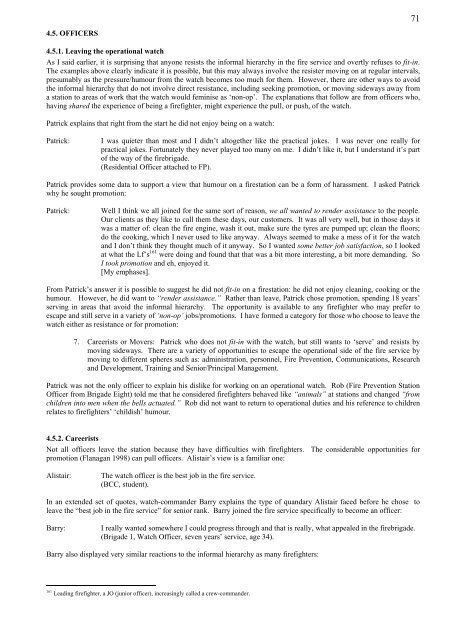One more last working class hero
One more last working class hero
One more last working class hero
Create successful ePaper yourself
Turn your PDF publications into a flip-book with our unique Google optimized e-Paper software.
4.5. OFFICERS<br />
71<br />
4.5.1. Leaving the operational watch<br />
As I said earlier, it is surprising that anyone resists the informal hierarchy in the fire service and overtly refuses to fit-in.<br />
The examples above clearly indicate it is possible, but this may always involve the resister moving on at regular intervals,<br />
presumably as the pressure/humour from the watch becomes too much for them. However, there are other ways to avoid<br />
the informal hierarchy that do not involve direct resistance, including seeking promotion, or moving sideways away from<br />
a station to areas of work that the watch would feminise as ‘non-op’. The explanations that follow are from officers who,<br />
having shared the experience of being a firefighter, might experience the pull, or push, of the watch.<br />
Patrick explains that right from the start he did not enjoy being on a watch:<br />
Patrick:<br />
I was quieter than most and I didn’t altogether like the practical jokes. I was never one really for<br />
practical jokes. Fortunately they never played too many on me. I didn’t like it, but I understand it’s part<br />
of the way of the firebrigade.<br />
(Residential Officer attached to FP).<br />
Patrick provides some data to support a view that humour on a firestation can be a form of harassment. I asked Patrick<br />
why he sought promotion:<br />
Patrick:<br />
Well I think we all joined for the same sort of reason, we all wanted to render assistance to the people.<br />
Our clients as they like to call them these days, our customers. It was all very well, but in those days it<br />
was a matter of: clean the fire engine, wash it out, make sure the tyres are pumped up; clean the floors;<br />
do the cooking, which I never used to like anyway. Always seemed to make a mess of it for the watch<br />
and I don’t think they thought much of it anyway. So I wanted some better job satisfaction, so I looked<br />
at what the Lf’s 161 were doing and found that that was a bit <strong>more</strong> interesting, a bit <strong>more</strong> demanding. So<br />
I took promotion and eh, enjoyed it.<br />
[My emphases].<br />
From Patrick’s answer it is possible to suggest he did not fit-in on a firestation: he did not enjoy cleaning, cooking or the<br />
humour. However, he did want to “render assistance.” Rather than leave, Patrick chose promotion, spending 18 years’<br />
serving in areas that avoid the informal hierarchy. The opportunity is available to any firefighter who may prefer to<br />
escape and still serve in a variety of ‘non-op’ jobs/promotions. I have formed a category for those who choose to leave the<br />
watch either as resistance or for promotion:<br />
7. Careerists or Movers: Patrick who does not fit-in with the watch, but still wants to ‘serve’ and resists by<br />
moving sideways. There are a variety of opportunities to escape the operational side of the fire service by<br />
moving to different spheres such as: administration, personnel, Fire Prevention, Communications, Research<br />
and Development, Training and Senior/Principal Management.<br />
Patrick was not the only officer to explain his dislike for <strong>working</strong> on an operational watch. Rob (Fire Prevention Station<br />
Officer from Brigade Eight) told me that he considered firefighters behaved like “animals” at stations and changed “from<br />
children into men when the bells actuated.” Rob did not want to return to operational duties and his reference to children<br />
relates to firefighters’ ‘childish’ humour.<br />
4.5.2. Careerists<br />
Not all officers leave the station because they have difficulties with firefighters. The considerable opportunities for<br />
promotion (Flanagan 1998) can pull officers. Alistair’s view is a familiar one:<br />
Alistair:<br />
The watch officer is the best job in the fire service.<br />
(BCC, student).<br />
In an extended set of quotes, watch-commander Barry explains the type of quandary Alistair faced before he chose to<br />
leave the “best job in the fire service” for senior rank. Barry joined the fire service specifically to become an officer:<br />
Barry:<br />
I really wanted somewhere I could progress through and that is really, what appealed in the firebrigade.<br />
(Brigade 1, Watch Officer, seven years’ service, age 34).<br />
Barry also displayed very similar reactions to the informal hierarchy as many firefighters:<br />
161 Leading firefighter, a JO (junior officer), increasingly called a crew-commander.
















